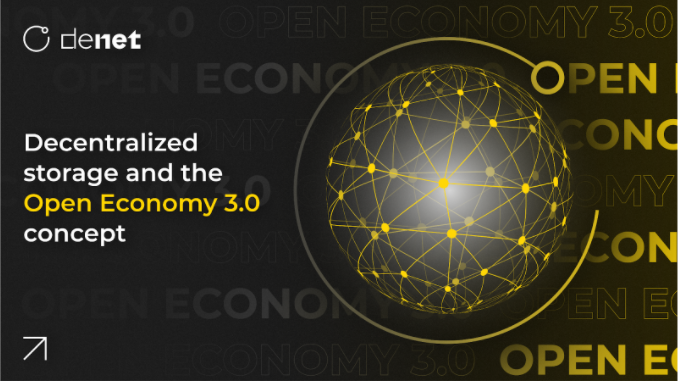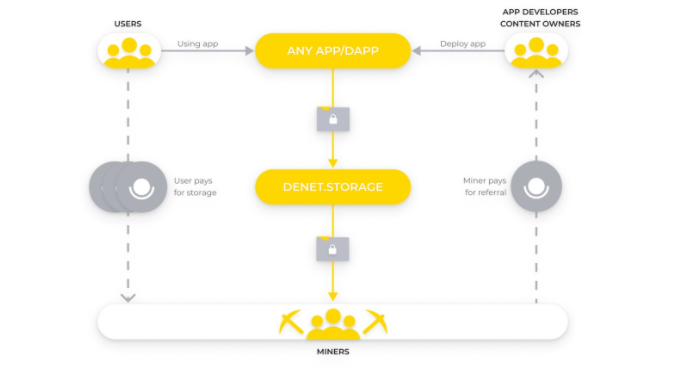
Earlier we talked about the disadvantages of existing centralized marketplaces. App stores, marketplaces for games, music, movies and books no longer meet the needs of users and creators. The main problems include annoying advertising, high prices, censorship, lack of transparency in the ratings and a low percentage of content creators’ profit.
Next generation dApp marketplaces should be free of these issues. DeNet developers offer a brand new business model for the Web 3 economy. We called it Open Economy 3.0. The concept purpose is to create highly transparent relations between all the economy participants, eliminating intermediaries, commissions and additional expenses.
Open Economy 3.0 base principles
Firstly, a marketplace in an Open Economy 3.0 must belong to all the participants. It means that it should not have a controlling organization or a beneficiary who takes most of the profits and sets the rules of the game. The right to choose the ways of development and establish the rules for the dApp marketplace functioning, its fees, commissions and rewards should be given to the community of users and developers. Only in this case it is possible to reach consensus and build a fair economy model.
Secondly, decentralization should also penetrate at all levels of technical infrastructure. Such dApp stores cannot rely on centralized services for computing, storing or hosting. The most advanced solutions should combine community-supported infrastructure and a system of economic incentives and counterweights.
Third basic principle of DeNet Open Economy 3.0 says that any participation in the creation of value will be paid. Ecosystem participants pay for the source of the value, in this case, for the storage network usage.
How does the Open Economy 3.0 work?
DeNet team is highly interested in the Web 3 industry development. Because of that we created a new monetization model, based on the Open Economy 3.0 concept. Ecosystem consists of 3 types of participants: users, dApp developers and miners.
Miners (also called Nodes) provide their unused storage space for the ecosystem. In exchange for it, other participants reward the nodes.
Users pay for downloading the app and its content, similar to their usage of an AppStore or Google Play services. The user fee for regular downloading applications from a dApp store can be very low, for example, $1-$2 per month. In return they get access to the whole Web 3 world from one place, freedom from ads, high prices and censorship.
Developers receive rewards for traffic that their app created in a decentralized storage based ecosystem, without any commission from the dApp store.
Those three participant groups are basic for the ecosystem, but this list can be widened and include new members.
Such an interaction scheme encourages miners to provide more hard disk space and developers — to improve dApps. Single and corporate users are attracted by the one-window access to Web 3, fair payment system and ad-free dApps usage.

DeNet Open Economy 3.0 concept
The use of a decentralized storage network and a system of economic incentives based on the principles of Open Economy 3.0 is beneficial to all participants of the marketplace. Developers receive most of the profits from downloading their programs and technical support, users pay less for the dApps. Miners receive fair rewards for the amount of storage they can provide to the network. And the most important thing is that these roles are available to everyone and compatible with each other.
Community force
A skeptical reader may doubt that the proposed Open Economy 3.0 scheme can be implemented in practice. Indeed, self-managed and community owned decentralized system is the ideal that all developers should seek for. But they work only if the majority of participants share the principles of decentralization and Open Economy 3.0, strive to put these ideas into practice and strictly follow them. This is an important condition for success, because, unfortunately, any decentralized system is vulnerable to centripetal forces.
If the ecosystem has a strong community, it manages to defend the principles on which the system is built. The better the interests of all stakeholders are balanced in it, the more stable the project is.
The purpose of the Open Economy 3.0 is to ensure this long-term sustainability, when it is more profitable for miners, application developers and users to comply with the rules of the game than to try to gain an advantage by violating them.
To reach this target, the DeNet team solves the problems of all ecosystem participants: creates a life-needed infrastructure in the form of a decentralized storage network, gathers dApps in one ecosystem and develops Open Economy 3.0 mechanisms that make cooperation beneficial for all participants.







